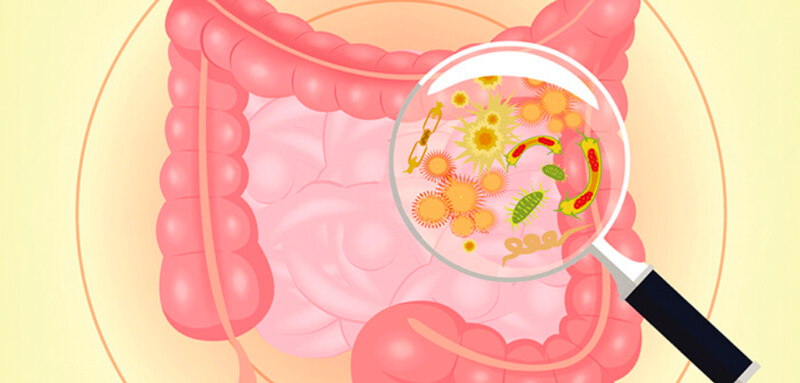
09 . 11 . 2018
The Relationship between Irritable Bowel Syndrome and Small Intestinal Bacterial Overgrowth
Irritable Bowel Syndrome (IBS) is a chronic gastrointestinal condition characterized by bloating, abdominal pain and altered bowel habits (constipation and/or diarrhea). It is an important cause of reduced quality of life, and the available therapeutic approaches are often not very effective.
Small Intestinal Bacterial Overgrowth (SIBO) refers to an excessive proliferation of bacteria in the small intestine, which is the part of the gastrointestinal tract specialized in nutrient absorption, and where the bacterial population is usually reduced. Historically, this bacterial overgrowth has been associated with anatomical abnormalities (presence of fistulas, post surgical “blind loops”, etc.) and altered intestinal motility (as in sleroderma, for example). However, the development of respiratory tests capable of quantifying the products of bacterial fermentation in the intestine (hydrogen and methane) has enabled the detection of SIBO in a larger number of patients.
Is there a relationship between IBS and SIBO?
There seems to be, in fact, an association between the presence of SIBO and symptoms of IBS. The magnitude of this association varies according to the different studies, which did not use the same substrates and criteria to diagnose SIBO. A 2010 meta-analysis showed that IBS patients had a 4 times greater probability of having a positive SIBO test result, when compared to healthy individuals.
How can excess bacteria contribute to IBS symptoms?
Overgrowth of bacteria in the small intestine leads to increased intestinal fermentation. The purpose of digestion is to extract the nutrients we need, but if the process is not complete, the non-fully digested material becomes food for the intestinal bacteria. Through a fermentation process, bacteria (and potentially fungi) digest carbohydrates releasing gases such as hydrogen and methane. This gas production can be responsible for symptoms like bloating, flatulence and changes in bowel movements.

Fig. 1 – Overgrowth of bacteria in the small intestine leads to increased gas production.
Can SIBO be treated?
Yes. The treatment aims to reduce the population of bacteria that are in excess and is based on the following principles:
– a decrease in the amount of available “food” for bacteria – the low FODMAP (Fermentable Oligo-, Di-, Mono-saccharides And Polyols”) diet is a very effective option in treating SIBO and relieving symptoms of IBS. It is a low fermentation diet that avoids difficult to digest carbohydrates.
– use of antibiotics – pharmaceuticals like rifaximin (used alone or in combination with neomycin or metronidazole) or botanical preparations with bactericidal activity.
Concurrently, any factors that can predispose to the proliferation of bacteria in the small intestine, such as gastric hypochlorhydria or intestinal dysmotility, should be corrected in order to prevent the recurrence of SIBO.
IBS is a complex and multifactorial condition. However, excessive proliferation of bacteria in the small intestine appears to be an important factor in the development of GI symptoms, and its treatment can result in significant improvements. Therefore, this possibility should be considered in IBS patients, whose symptoms are often debilitating and poorly understood.
References:
Triantafyllou K, Chang C, Pimentel M. Methanogens, methane and gastrointestinal motility. Journal of Neurogastroenterology and Motility. 2014;20(1):31-40.
Marsh A, Eslick EM, Eslick GD. Does a diet low in FODMAPs reduce symptoms associated with functional gastrointestinal disorders? A comprehensive systematic review and meta-analysis. European Journal of Nutrition. 2016;55(3):897-906.
Shah ED, Basseri RJ, Chong K, Pimentel M. Abnormal breath testing in IBS: A meta-analysis. Digestive Diseases and Sciences. 2010;55(9):2441-2449.